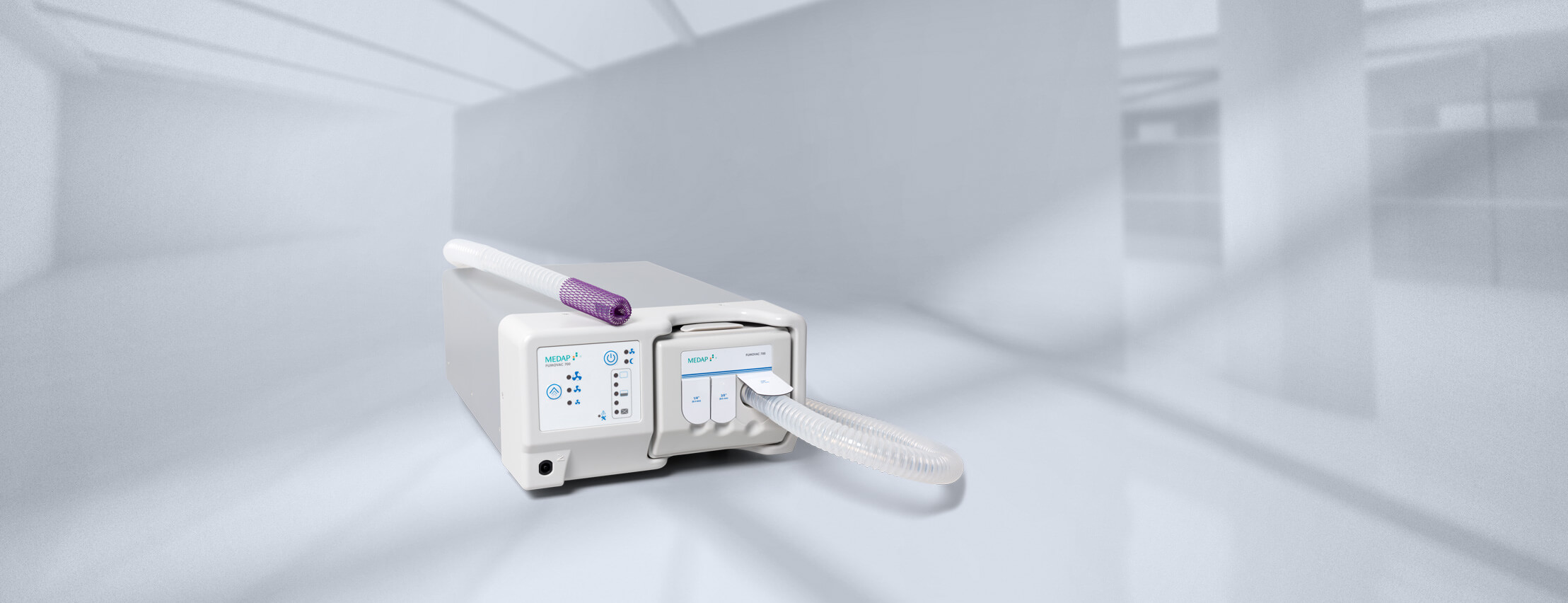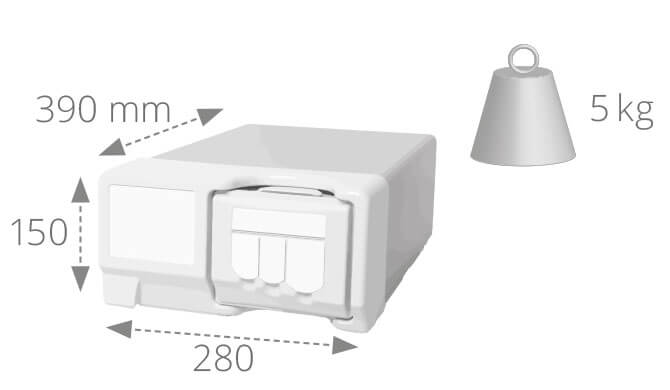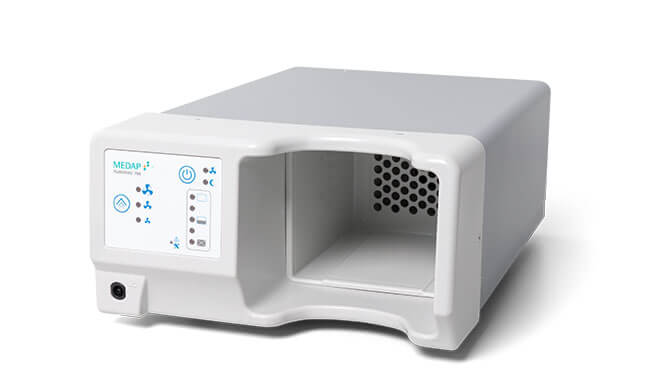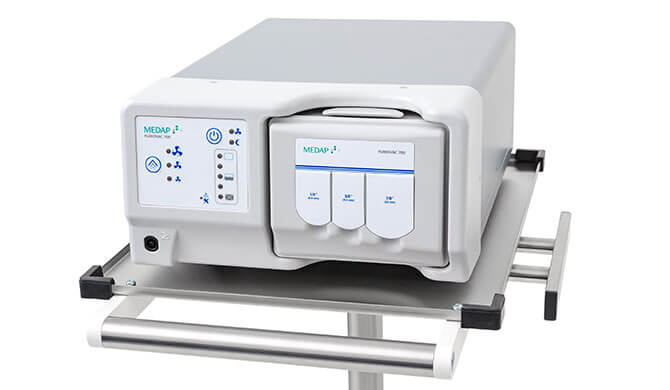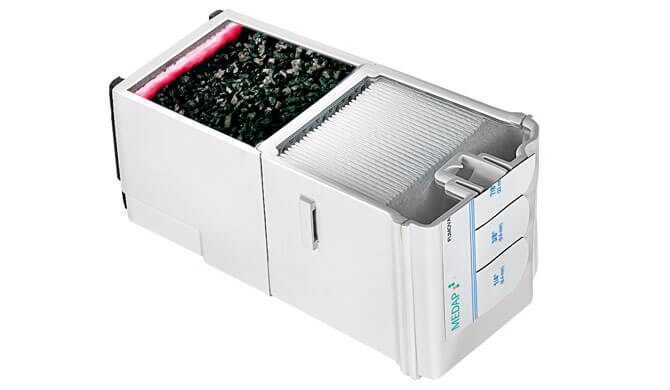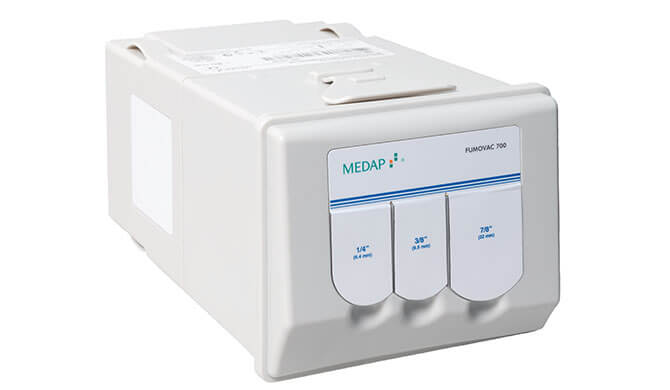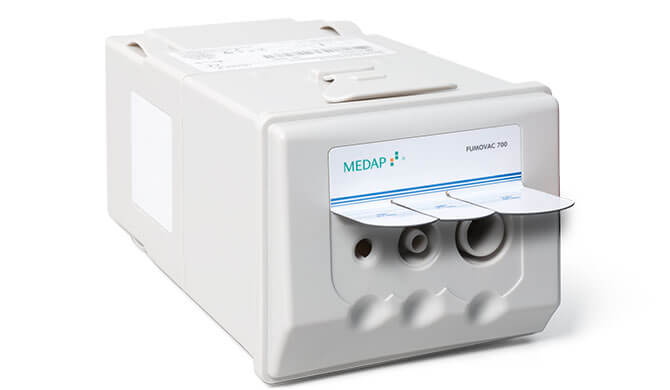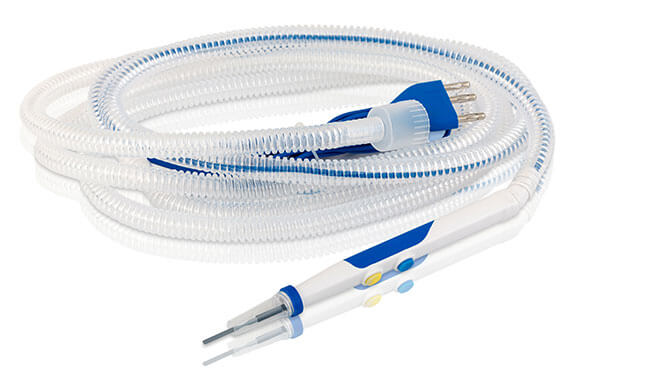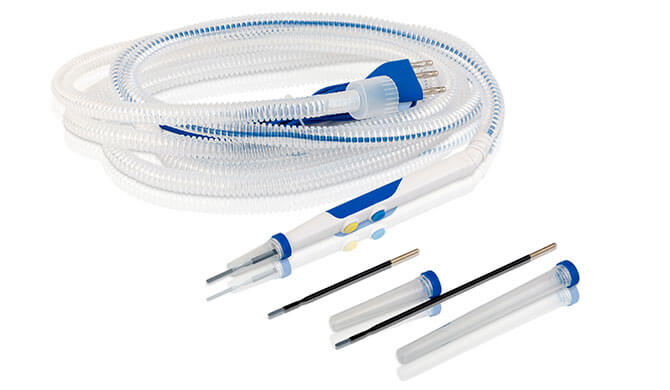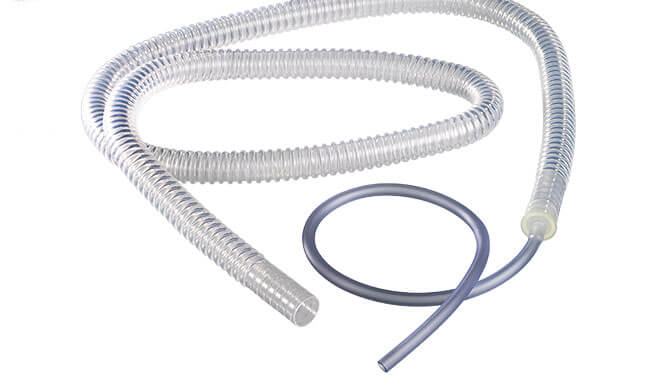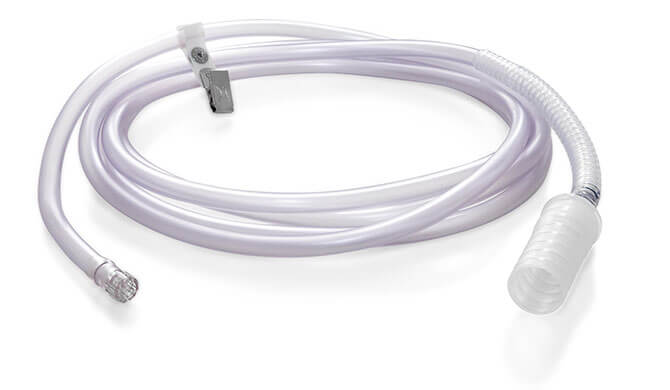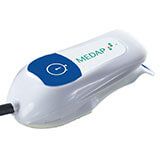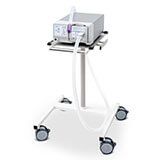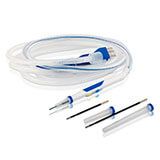MEDAP FUMOVAC 700
For a smoke-free OR
The powerful, compact MEDAP FUMOVAC 700 smoke evacuation unit is designed for continuous operation in the operating room and offers an extremely quiet flow rate of 700 l/min. It fulfils all the requirements of modern HF, RF, ultrasound, and laser surgery. The four-stage high-performance filter is fitted with three inputs of different sizes, tailoring it to suction tubes with a diameter of 22 mm (7/8"), 9.5 mm (3/8"), and 6.4 mm (1/4"). The inputs are protected with magnetic flaps.
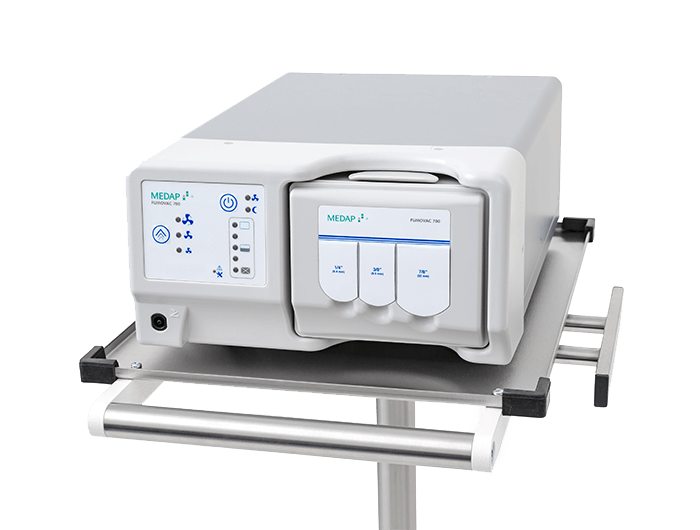

Intuitive operation
thanks to just two buttons and particularly easy connection to HF devices

Efficient filter
through four filter stages and a long filter lifetime
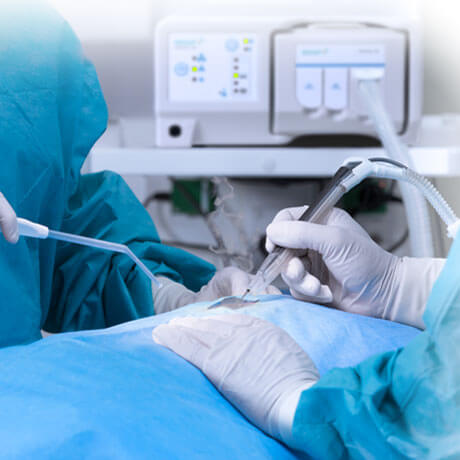
Contamination protection for the OR team
through targeted evacuation of surgical smoke before it reaches the breathing zone of the OR team
Applications
- Hospital / clinic
- Operating room / anesthesiology
- ENT practice
- Gynecology practice
- Doctor's practice
- Outpatient surgery center
Compact and lightweight
The dimensions and weight of this device are 50 percent smaller than those of the previous model, ensuring exceptionally easy and space-saving integration into the OR environment. The MEDAP FUMOVAC 700 can be integrated into all conventional HF towers, or it can be placed on the platforms of ceiling supply units.
Control panel
It is operated using just two buttons. LEDs indicate the operating status, selected flow rate, remaining filter lifetime, and possible need for servicing.
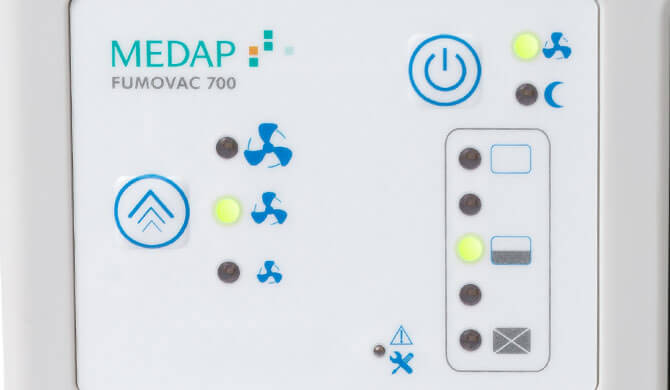
High-performance filter
The filter is particularly efficient thanks to its four filter stages, three inputs with magnetic flaps, and a filter lifetime of up to 35 hours.
Remote switch activator
The automatic HF remote switch activator detects currents when the HF pencils are switched on and off and switches the smoke evacuation unit on and off at the same time. A lag time can be set if desired.
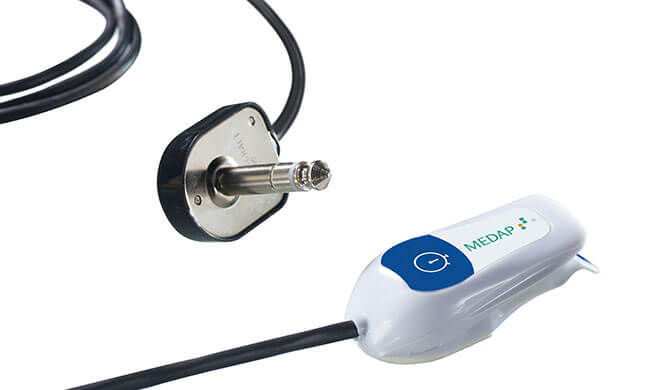
Comprehensive range of
suction tubes
Optimised tube sets allow the best possible smoke evacuation for almost all indications, whether laser or HF surgery or laparoscopy. For laser surgery, flow-optimised tubes with a large inner diameter ensure the greatest possible flow.
Versions
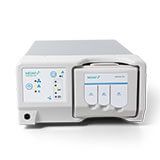
Complete unit
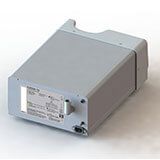
Complete unit CGS
Technical Data
MEDAP FUMOVAC 700
Suction capacity
700 l/min
Operating mode
Continuous operation
Voltage
220-240 V~, 50/60 Hz
Special voltage
100-120 V~, 50/60 Hz
Dimensions (H x W x D)
150 x 280 x 390 mm
Weight
5.0 kg (with filter)
4.0 kg (without filter)
Noise level
55 dB(A)
Filter inputs
3 (22 mm / 9.5 mm / 6.4 mm)
Filter lifetime
18 / 24 / 35 h
Filter stages
4
FAQ
Normal ventilation in the operating room exchanges the air up to 24 times per hour. This is not sufficient to remove the locally generated aerosols and gases quickly enough to prevent them from posing a danger to the OR team.
No. These systems reach the following capacities:
- Central gas supply — vacuum: seldom over 50 l/min
- Central gas supply — compressed air: seldom over 40 l/min
- Electrical surgical aspirator — seldom over 60 l/min
Studies have found that a capacity of least 400–600 l/min is necessary for effective smoke evacuation.
In addition, electrical surgical aspirators and suctioning with compressed air via the central gas supply release the air into the operating room again. Since there is no odour filter, the unpleasant odours return to the operating room.
Finally, surgical smoke can also damage the motor in electrical surgical aspirators and the complex mechanisms in tapping units if no special smoke evacuation filter is installed.
It will always be very difficult to prove that certain biological substances were transmitted to a person during a particular operation and that such material caused a certain disease in that person possibly many years later.
Toxicological studies have identified erythrocytes and living cell material as well as biological contaminants, such as viruses, bacteria, mycobacteria, and fungi. Even viral DNA and HIV DNA have been found in tubes used for smoke evacuation and could be cultivated. In addition, inorganic and organic substances, such as carbon monoxide, benzene, formaldehyde, toluene, and carcinogenic toxins, have been detected.
The Technical Rules for Hazardous Substances in medical care facilities (TRGS 525) of the Federal Institute for Occupational Safety and Health in Germany (Bundesanstalt für Arbeitsschutz und Arbeitsmedizin) in the version of September 2014 explicitly specify the hazards of surgical smoke in chapter 8.1 and define the appropriate protective measures.
There are many studies in which over 41 different chemical substances have been found whose carcinogenic or teratogenic effect in animals and/or humans have either already been proven or suspected. Toxicological studies have identified erythrocytes and living cell material as well as biological contaminants such as viruses (e.g. papillomaviruses), proteins, prions (BSE agent), bacteria, mycobacteria, and fungi. Even viral DNA and HIV DNA have been found in tubes used for smoke evacuation and could be cultivated.
Since 90 percent of the particles present in surgical smoke are smaller than 0.3–0.5 μm, they can penetrate deep into the alveoli of the OR team and even be absorbed by the blood. This can result in pulmonary inflammations and is presumably even carcinogenic, the risk of infection via the mucous membranes and airways being higher with low-temperature vapours since temperature-resistant germs are not killed.
Frequently, the particles cause irritation of the throat and nose as well as respiratory problems or allergic reactions. The rule is: the smaller the particles, the more dangerous they are from a chemical perspective; the larger the particles, the more dangerous they are from a biological perspective. Studies have also found that vapourised tissue and cigarette smoke have similar toxic components ranging from polycyclic, aromatic hydrocarbons, cresols and phenols to hydrogen cyanides, acrolein, formaldehyde, and carbon monoxide.
During laser and HF surgery, cutting and coagulation produce smoke with unpleasant odours. This deteriorates the air quality in the operating room to such an extent that the OR team can experience headaches and nausea. Especially the organic components in the smoke are known to cause tiredness and a feeling of faintness as well as cardiac arrhythmia and breathing difficulties.
Downloads
| Title | Date | Extension | Size | Language |
|---|---|---|---|---|
| Brochures & Flyers | ||||
| Brochure ATMOS Medical Suction Systems | 07.09.2023 | 3.58 MB | en, ru, cn, hu | |
| Brochure ATMOS Smoke Evacuation | 22.03.2021 | 1.82 MB | en, ru, cn, hu | |
| Brochure MEDAP Medical Suction Systems | 22.03.2021 | 1.40 MB | en, ru, cn, hu | |
| Technical Documentation | ||||
| Declaration of Conformity / Konformitätserklärung Accessories Fixation / Zubehör Befestigungen | 27.05.2024 | 262.67 KB | de, en, fr, cn, es, hu | |
| Declaration of Conformity / Konformitätserklärung Accessories Trolley / Zubehör Fahrgestell | 27.05.2024 | 202.95 KB | de, en, fr, cn, es, hu | |
| Operating Instructions MEDAP FUMOVAC 700 | 20.05.2022 | 4.14 MB | en | |
Accessories
To ensure an optimum workflow, a remote switch activator is available that only activates the smoke evacuation unit when surgical smoke develops.
A special trolley allows for optimum positioning within the OR workflow.
Whether existing disposable or reusable electrosurgical pencils are to be used or a tube set with built-in disposable electrosurgical pencils, ATMOS offers a comprehensive range of tubes. For gynaecology and ENT medicine, ATMOS offers a special tube set for direct connection to speculum forceps. A special tube set for laparoscopy with a Luer connection for trocars and a flow limiter for minimal gas loss rounds out the ATMOS product range.
Contact
